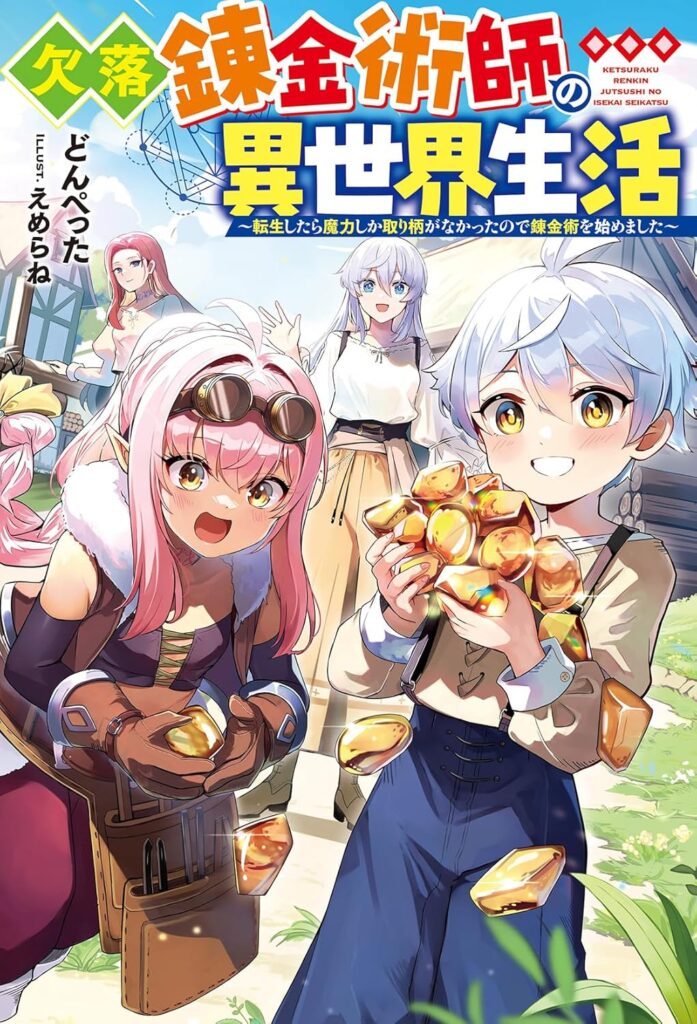
Kays Translations
Just another Isekai Lover~
Chapter 3: Before It’s Too Late
Now then— It was the month of June, the season of ripened barley. That meant it was not only the time of harvest but also the time for taxes to be collected. The air was heavy with the promise of long days under the sun, bending low to the earth, hands roughened by work, and yet there was a certain rhythm and familiarity to it all.
“Al, today we begin the barley harvest. Are you ready for it?”
“I’m fine, really,” I replied with a faint grin, trying to sound more confident than I felt.
“Fana, I’ll be counting on you as well.”
“Yes, Lady Tine,” came her dutiful response, her voice calm and clear.
Harvesting barley was the farmer’s responsibility all the way until threshing. Though our field was not terribly large, it still demanded its share of sweat and hours. Cutting down the stalks and setting them out to dry could be managed by Mother and Stefana alone in about two days. After that, the bundles would be left under the sun for roughly two weeks before the actual threshing began.
The system of taxation was simple, if harsh. Each household was bound by a poll tax, payable in barley—two sacks, each weighing fifty kilograms, per person above the age of five. If the harvest had been poor, however, there was the alternative of paying with silver—five coins for each person—or in certain desperate cases, the possibility of a reduction or exemption. To prevent dishonesty, the tax officers made their rounds before harvest began, inspecting the fields and taking note of the villagers’ numbers.
Our own tax officer, Master Keties, had already come by in the middle of the previous month, moving with that sharp-eyed diligence of his, ensuring no trickery lurked behind smiling faces.
But that aside—lately, a more personal, more irritating problem had been making itself known.
The village chief’s son, Autihel, had begun pestering my mother.
Until last year, he had kept his distance, a quiet youth watching her from afar. Yet since the new year, it was as though he had been transformed—suddenly full of confidence, strutting about with an air that seemed to shout Look at me! His “approaches” had grown bolder, bordering on presumptuous.
But… why?
Once, I might have described him as a modest young man, the sort whose presence was barely noticeable. Now, he reminded me of a boy who, after stepping into a city high school for the first time, fancied himself reborn as someone new and dashing.
And yes—Mother was beautiful. Of course men would be drawn to her. That much, even I had to admit, was inevitable.
But the problem was not his feelings. The problem was that, in some bizarre twist of self-delusion, Autihel seemed to think my mother wanted to marry him.
As the son of the village chief, he had indeed received the formal education required of heirs: literacy, arithmetic, horsemanship for emergencies, and enough martial training to defend against beasts or bandits. Those three years of study with the lord’s household gave him a certain prestige.
To the women of the village, such a man would be the most desirable of matches. Strong, educated, heir to the family that governed their daily lives.
But to my mother, who had been raised as the daughter of a viscount’s house? His status and skills were hardly impressive.
“Lady Tine, surely it must be difficult for two women alone to manage the harvest. Allow me to lend my hand this year.”
Mother’s reply was immediate, her voice calm but cutting.
“No, the yield is no greater than last year’s. We require no additional help.”
Yet Autihel persisted, calling her “Tine” without permission, wearing a smile so wide it almost seemed plastered to his face.
“Ha! What are you saying? Once we’re married we’ll live together. There’s no need to be shy with your husband.”
Mother’s eyes narrowed into something icy and sharp.
“…What exactly are you talking about?”
I found myself silently echoing the same question.
He spoke as though marriage had already been arranged, when no proposal had ever been made.
“I know you are reserved,” he continued smoothly, “but you’ve suffered, haven’t you? Cast out from your home, raising your child in hardship. From now on, I’ll be the one to make you happy.”
Her lips tightened. “I think you misunderstand. I will not be marrying.”
But he heard none of it. Or rather, he twisted her words into some shape that suited his own fantasy.
“Ah, I see. You’re nervous, aren’t you? Understandable, before a wedding. Very well, I’ll leave for today. But if you ever need me, you only need to ask.”
With that, he left—satisfied, convinced, as though he had been speaking not to another person, but to his own reflection in a mirror.
“…Mother?” I asked cautiously, unsettled.
She sighed, her gaze distant. “Al, what would you think if he were to become your father?”
The thought flashed into my mind—his smug face, his hollow words—and I immediately shook my head. “I’d run away from home.”
Her smile softened, her hand stroking my hair. “Then we’ll run away together.”
I pressed my lips together. Of course, I would never even allow things to come that far.
“Lady Tine, what has come over him?” Stefana asked, her brow creased.
“I’m not certain. I can only assume something happened during his stay in the lord’s city.”
Ah, yes. The beginning of the year, when monsters attacked our village. The walls had been breached in places, repairs were urgent. Autihel had gone to the baron’s city to report the damage and purchase supplies. He returned with materials—and, apparently, an inflated sense of himself.
“And what does the chief say?” I asked.
“That,” Mother said wryly, “is the strangest part. He believes I already consented to the marriage.”
“What?!” Stefana’s voice snapped sharp with outrage.
Mother patted her head to soothe her before explaining further. The chief had been pleased when his son returned more assertive, capable enough to see the wall repairs through. In his joy, he’d told Autihel it was time to marry and provide an heir. At that moment, Autihel had apparently declared his intent to marry Mother. And then, somehow, he had reported back that she had accepted.
She, of course, had done nothing of the sort.
“…So, Mother, what’s really going on here?”
“I wish I knew. I even told the chief outright that I had not agreed, and he only smiled and said he understood.”
That made no sense. The chief seemed to recognize she had not agreed—yet still, the story of her “consent” spread.
The truth was beginning to feel darker, heavier. Autihel’s behavior was shifting toward something unsettling, something that carried the stink of obsession.
“Mother, you’ll need to put an end to this firmly. Otherwise, people may begin to speak ill of you.”
“You’re right. Best to settle it before it festers.”
“What about asking Master Keties to mediate? As a tax officer, he’d be impartial.”
Mother hesitated. “Would that not be an imposition?”
“No more than asking any villager, and at least he wouldn’t be swayed by the chief’s standing.”
Stefana’s eyes flashed with resolve. “Allow me to make the arrangements. The baron entrusted me with the authority to act on my judgment. And I am acquainted with Master Keties. He will listen.”
Mother blinked, then gave a slow nod. I, too, found relief in Stefana’s firmness.
The matter was set aside—for now. It would be addressed after the harvest.
“Al, Fana, let us begin the reaping,” Mother said.
“Yes.”
“Of course.”
And so we turned to the work before us.
Mother swung the sickle, severing golden stalks with practiced ease. I gathered them into heavy bundles, arms straining against their weight, and Stefana carried them to where they would dry under the sun. We rotated tasks, resting when we had to, steady and patient until, after three days, every last stalk of barley lay tied and drying.
“A little slower than usual, but it is done,” Stefana observed.
“Al, Fana, thank you both,” Mother said warmly.
I lowered my gaze. “I didn’t do much… I was more of a burden, really.”
It was true—I had struggled with the tall bundles, and it had been their help that brought the harvest to completion.
Mother’s hand rested on my shoulder. “You did your part.”
And then, at last, with the harvest behind us, the matter of Autihel could be faced properly.
“Fana, please arrange the discussion,” Mother said.
“Yes. Leave it to me,” she answered with quiet determination.
The time for evasions was over. The truth would be spoken, plainly and undeniably.
